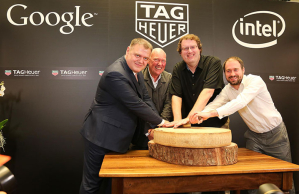
In a move perhaps designed to blunt the impact of the much-hyped Apple Watch, Silicon Valley tech giants Google and Intel have announced Thursday that they would team up with Swiss watchmaker TAG Heuer to create a new luxury Android smartwatch.
According to Pete Carey of San Jose Mercury News, all three companies made the announcement at the Baselworld trade show in Switzerland, an annual event where many watchmaking companies tout their latest innovations and models. The companies said that their collaboration would help "create a product that is both luxurious and seamlessly connected to its wearer's daily life."
"Silicon Valley meets Switzerland," TAG Heuer CEO Jean-Claude Biver said. "What a great moment!"
Michael Bell of Intel, who was there alongside David Singleton of Google, also expressed excitement over their latest venture into the world of smartwatches.
"We believe wearable technology is going to take off but this is not something that can be driven by tech companies only," Bell said.
Singleton, who is the director of engineering for Android Wear, told Carey that the team will "bring a unique blend of emotion and innovation to the luxury market."
Steven Pulvirent and Corinne Gretler of Bloomberg reported that TAG Heuer was the first traditional watchmaker to pair with Google. All three companies hoped to grab a piece of the global market for smartwatches, which could rise from 4.6 million in 2014 to as much as 28.1 million units this year according to researcher Strategy Analytics.
"When I think about the watch, it's always been a marriage of beauty and utility," Singleton said. "We're going to do that with our partnership."
According to Bloomberg, TAG Heuer will design and manufacture the watch while Google will lend its Android Wear platform and Intel will provide the chips (SoC platform).
Carey reported that the Swiss watchmaking industry is best known for "its bejeweled mechanical chronographs that keep exacting time." However, some Swiss watch companies are trying to jump into the "Internet of Things" trend through making smartwatches, a form of wearable tech.
"The number of Swiss watch brands adding electronic features has blossomed since Apple joined the battle for customers' wrists," Pulvirent and Gretler wrote. "Swatch, Breitling, Montblanc, and Frederique Constant are among those that have entered the fray, with products ranging from a messaging device that clips to a watch strap to a gold-plated watch containing a fitness tracker."
Bloomberg reported that unlike other watch models, the smartwatch produced by TAG Heuer, Google and Intel will not be made in Switzerland. The product is scheduled to be launched by the end of the year, when price and functions will be announced.
"The difference between the TAG Heuer watch and the Apple watch is very important," Biver said. "That one is called Apple and this one is called TAG Heuer."
Gartner technology analyst Mark Hung told Carey that the Apple Watch could threaten watches in "the $500 to $2,000 range" when it hits the market. He argued that traditional luxury watchmakers could respond by either making their own proprietary products or working with Google.
"It makes sense to partner with Google," Hung said.






